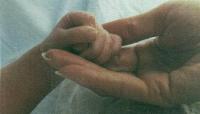The U.S. Supreme Court upholds ban on controversial abortion procedure
The Supreme Court upheld the U.S. ban on a controversial abortion procedure, handing abortion opponents the long-awaited victory they expected.

The 5-4 ruling said the Partial Birth Abortion Ban Act that Congress passed and President George W. Bush signed into law in 2003 does not violate a woman's U.S. constitutional right to an abortion.
The opponents of the act "have not demonstrated that the Act would be unconstitutional in a large fraction of relevant cases," Justice Anthony Kennedy wrote in the majority opinion.
The decision pitted the court's conservatives against its liberals, with Bush's two appointees, Chief Justice John Roberts and Justice Samuel Alito, siding with the majority.
Justices Clarence Thomas and Antonin Scalia also were in the majority.
It was the first time the court banned a specific procedure in a case over how not whether to perform an abortion.
Abortion rights groups have said the procedure sometimes is the safest for a woman. They also said that such a ruling could threaten most abortions after 12 weeks of pregnancy, although government lawyers and others who favor the ban said there are alternate, more widely used procedures that remain legal.
The outcome is likely to spur efforts at the state level to place more restrictions on abortions.
More than 1 million abortions are performed in the United States each year, according to recent statistics. Nearly 90 percent of those occur in the first 12 weeks of pregnancy, and are not affected by Wednesday's ruling.
Six federal courts have said the law that was in focus Wednesday is an impermissible restriction on a woman's constitutional right to an abortion.
The law bans a method of ending a pregnancy, rather than limiting when an abortion can be performed.
"Today's decision is alarming," Justice Ruth Bader Ginsburg wrote in dissent. She said the ruling "refuses to take ... seriously" previous Supreme Court decisions on abortion.
Ginsburg said the latest decision "tolerates, indeed applauds, federal intervention to ban nationwide a procedure found necessary and proper in certain cases by the American College of Obstetricians and Gynecologists."
She was joined by Justices Stephen Breyer, David Souter and John Paul Stevens.
The procedure at issue involves partially removing the fetus intact from a woman's uterus, then crushing or cutting its skull to complete the abortion.
Abortion opponents say the law will not reduce the number of abortions performed because an alternate method dismembering the fetus in the uterus is available and, indeed, much more common.
In 2000, the court with key differences in its membership struck down a state ban on partial-birth abortions. Writing for a 5-4 majority, Justice Breyer said the law imposed an undue burden on a woman's right to make an abortion decision.
The Republican-controlled Congress responded in 2003 by passing a federal law that asserted the procedure is gruesome, inhumane and never medically necessary to preserve a woman's health. That statement was designed to overcome the health exception to restrictions the court has demanded in abortion cases.
But federal judges in the states of California, Nebraska and New York said the law was unconstitutional, and three appellate courts agreed. The Supreme Court accepted appeals from California and Nebraska.
Kennedy's dissent in 2000 was so strong that few court watchers expected him to take a different view of the current case.
Subscribe to Pravda.Ru Telegram channel, Facebook, RSS!


